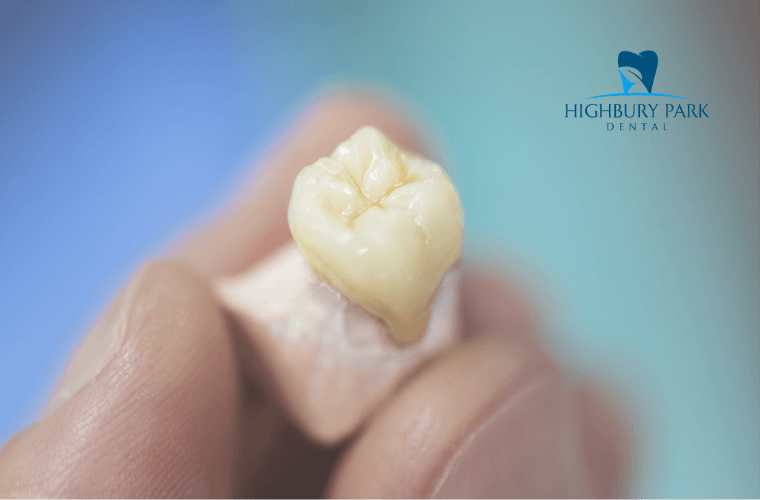Keeping your teeth pearly and safe
The easiest solution for damaged teeth is to put a crown on it. This generally restores the look and function of your natural tooth, however, that doesn’t mean it’s not susceptible to further damage, disease, or decay. This article will explain signs of tooth decay under a crown, what to do, and how to prevent this from happening.
Read More: BRIDGES, CROWNS, VENEERS, BONDING – WHAT’S THE DEAL?
Dental crowns explained
Dental crowns are often used to correct underlying tooth damage. Dentists install the crown to restore the tooth’s healthy appearance and function, but this also instills false confidence in a lot of patients, driving them to go back to bad habits. Unfortunately, the crown isn’t as strong as the enamel it’s made of, and the immortality of the dental crown is real – meaning you have to take care of it as if it is your real tooth.
Read More: HOW YOUR ORAL HEALTH CHANGES AS YOU AGE
Why do teeth rot under crowns?
Poor dental hygiene
Often surprising patients, dental crowns do not serve as a helmet against the regular risks bacteria poses to our oral health. If you neglect your dental hygiene and fail to do your part to upkeep your oral health, your crowns will still fail you. Take care of your crown through flossing, brushing regularly, and being vigilant about your teeth cleanings, and they will be good to you.
Damage to crowns
If your crown is damaged, it is likely to build up bacteria and cause tooth decay. Whether it’s the crown damage itself collecting the bacteria to deliver into the gums or the aggravation of the gums is causing a tooth infection, damaged crowns aren’t good news when it comes to up-keeping your oral health.
Ill-fitting crown
If a crown is poorly fitted (which you can avoid by choosing the right dentist), the bacteria is likely to build up and aggravate tooth decay. Tooth cavities hidden beneath crowns are also prevalent.
Read More: SIGNS YOU MAY HAVE A CAVITY AND HOW TO PREVENT THEM
Not visiting the dentist regularly
Regular visits to the dentist can make all the difference in your health and wellness lifestyle, starting with how you maintain your crown. Especially if you have a crown or any other type of dental assistance, maintaining a regular schedule of professional teeth cleanings and checkups is important. Your dentist knows how to spot any looming complications with your crown and can identify if your crown is at risk for damage. The dentist is also skilled at proper cleaning, which can keep you from developing cavities, gingivitis, or anything else associated with poor dental help.
How to tell if your tooth is rotting beneath a crown
If the affected area is quite small, it can be hard to detect any cavities or decay underneath it. To determine this, the dentist will usually use an x-ray. It will be up to him or her to know whether the teeth underneath are rotten or has any damage. In some cases, the dentist will be able to notice the infection right away. On the other hand, an in-depth oral examination may be necessary.
Read More: THE DIFFERENT STAGES OF TOOTH DECAY AND HOW IT’S TREATED
Tips to prevent tooth rot
Proper/frequent dental hygiene
It’s never too late to train yourself to be vigilant about your dental hygiene routine. Make sure that you take brushing and flossing very seriously, brushing your teeth at least twice a day and flossing to follow, in order to fight the plaque and bacteria buildup that collects.
Avoid rupturing the crown
Some foods can be deadly to your sensitive crown. Avoid foods that take a lot of teeth to enjoy: steak, popcorn, hard candy, chewing gum, raisins and etc., are examples of foods that take a lot of bite, which makes them susceptible to rupture your crown. Habits that are terrible for dental health also include drinking acidic liquids such as orange juice and coffee, and it goes without saying – smoking. Smoking is not only a terrible habit for your lungs, skin, hair, and heart, but for your teeth as well – crown or not.
Fix crown immediately if damaged
Don’t waste time with a damaged crown in your mouth. The longer you keep your crown broken, the more likely you are to contact an uncomfortable oral disease or malfunction. Avoid gum disease and tooth rot by getting it fixed.
Schedule frequent checkups with your dentist
Nobody can look after your teeth like your dentist can so make sure to do your diligence and keep up-to-date with your cleanings and checkups. With frequent checkups, you can identify any issues straight away before they take a turn for the worst. You do not want to end up with a toothless smile or painful surgery to correct an issue that could’ve been avoided with a little bit of TLC – tooth loving care!
Keep your smile healthy and honor your crown by taking care of it. The best way to do so is to make sure you’re happy with the dental services you’re using. Having a great dentist to visit regularly can make all the difference when keeping the shine in your smile and the healthy tooth sitting behind its protective crown.

